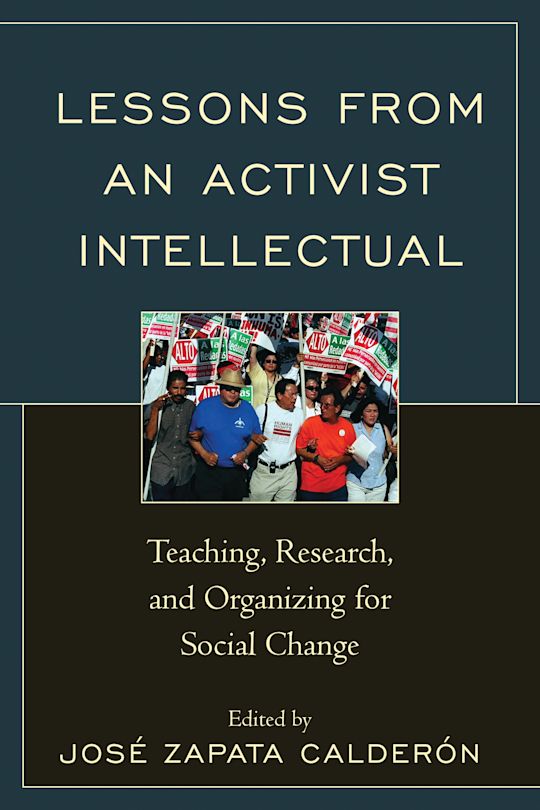- Home
- ACADEMIC
- Politics & International Relations
- Politics - Other
- Lessons from an Activist Intellectual
Lessons from an Activist Intellectual
Teaching, Research, and Organizing for Social Change
Lessons from an Activist Intellectual
Teaching, Research, and Organizing for Social Change
This product is usually dispatched within 3 days
- Delivery and returns info
-
Free US delivery on orders $35 or over
You must sign in to add this item to your wishlist. Please sign in or create an account
Description
Lessons from an Activist Intellectual provides examples of how an academician can combine the roles of teacher, researcher, and activist with a community-based critical pedagogy for democracy and empowerment. This book discusses the interconnections made between José Calderón’s pedagogy and his history as an immigrant, student, social movement leader, researcher, professor, and community organizer. At the same time, it provides examples of an interactive, intercultural, and interdisciplinary pedagogy that involves both students and community participants as both teachers and learners in social change projects. This style of pedagogy has particular salience for historically excluded individuals from diverse racial, class, gender, and sexuality backgrounds, for whom the educational experience can be either an alienating or empowering experience.
Table of Contents
Introduction
Chapter 1. Inclusion or Exclusion: One Immigrant’s Experience of Cultural and Structural Barriers to Power Sharing and Unity
By José Zapata Calderón
Chapter 2. Lessons from an Activist Intellectual: Participatory Research, Teaching, and Learning for Social Change
By José Zapata Calderón
Chapter 3. Latinos and Ethnic Conflict in Suburbia: The Case of Monterey Park
By José Zapata Calderón
Chapter 4. Language Struggles in a Changing California Community
By José Zapata Calderón and John Horton
Chapter 5. How the English Only Initiative Passed in California
By José Zapata Calderón
Chapter 6. “Hispanic” and “Latino”: The Viability of Categories for Panethnic Unity
By José Zapata Calderón
Chapter 7. Situational Identity of Suburban Mexican American Politicians in a Multi-Ethnic Community
By José Zapata Calderón
Chapter 8. Multi-Ethnic Coalition Building in a Diverse School District
By José Zapata Calderón
Chapter 9. Doing Sociology: Connecting the Classroom Experience with a Multi-Ethnic School District
By José Zapata Calderón and Betty Farrell
Chapter 10. Partnership in Teaching and Learning: Combining Critical Pedagogy with Civic Engagement and Diversity
By José Zapata Calderón
Chapter 11. A Multicultural and Critical Perspective on Teaching through Community: A Dialogue with José Calderón of Pitzer College
By Sandra Enos
Chapter 12. Organizing Immigrant Workers: Action Research and Strategies in the Pomona Day Labor Center
By José Zapata Calderón, Suzanne F. Foster, and Silvia L. Rodriguez
Chapter 13. Immigration Raids in the Inland Empire: A Historical Pattern and Its Responses
By José Zapata Calderón
Chapter 14. Linking Critical Democratic Pedagogy, Multiculturalism, and Service Learning to a Project-Based Approach
By José Zapata Calderón and Gilbert R. Cadena
Chapter 15. Civic Engagement: A Tool for Building Democracy
By José Zapata Calderón
Chapter 16. Perspective-Taking as a Tool for Building Democratic Societies
By José Zapata Calderón
Chapter 17. Latin@s and Social Movements in the Obama Years
By José Zapata Calderón
Chapter 18. One Activist Intellectual’s Experience in Surviving and Transforming the Academy
By José Zapata Calderón
Chapter 19. The Commonalities in Our Past Transform Pedagogy for the Future
By José Zapata Calderón
Product details
| Published | Aug 11 2015 |
|---|---|
| Format | Paperback |
| Edition | 1st |
| Extent | 236 |
| ISBN | 9780761865889 |
| Imprint | University Press of America |
| Dimensions | 9 x 6 inches |
| Publisher | Bloomsbury Publishing |
About the contributors
Reviews
-
Taken together, these articles provide a blueprint for activist-intellectuals who seek to bridge the gap that often exists between the academy and surrounding communities.
Pitzer College


































